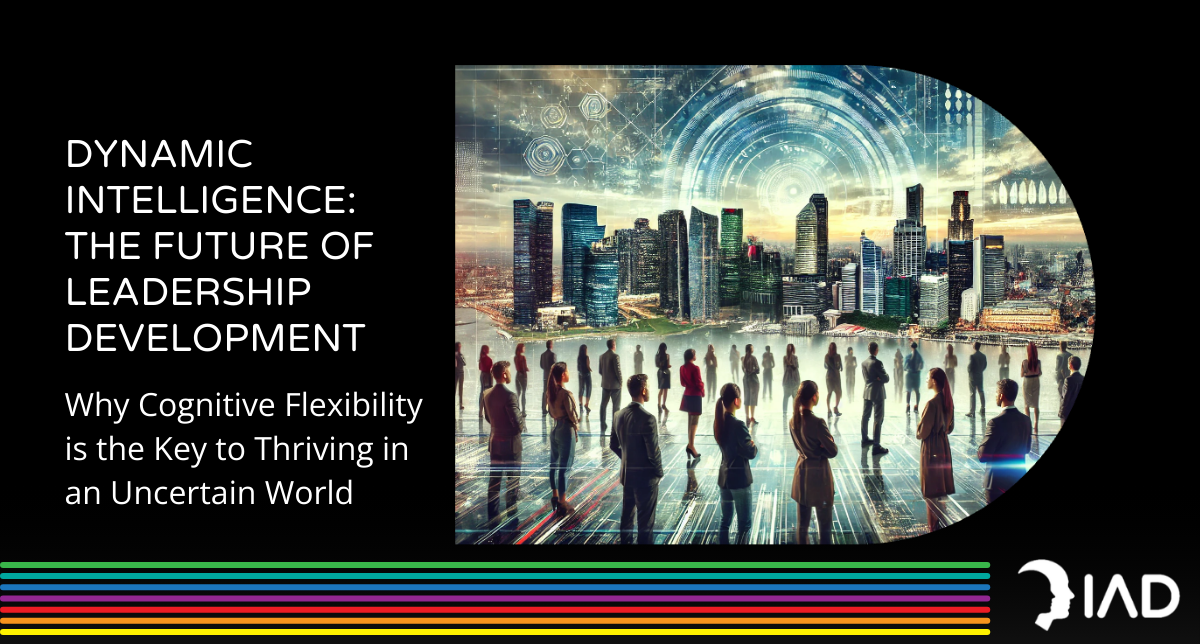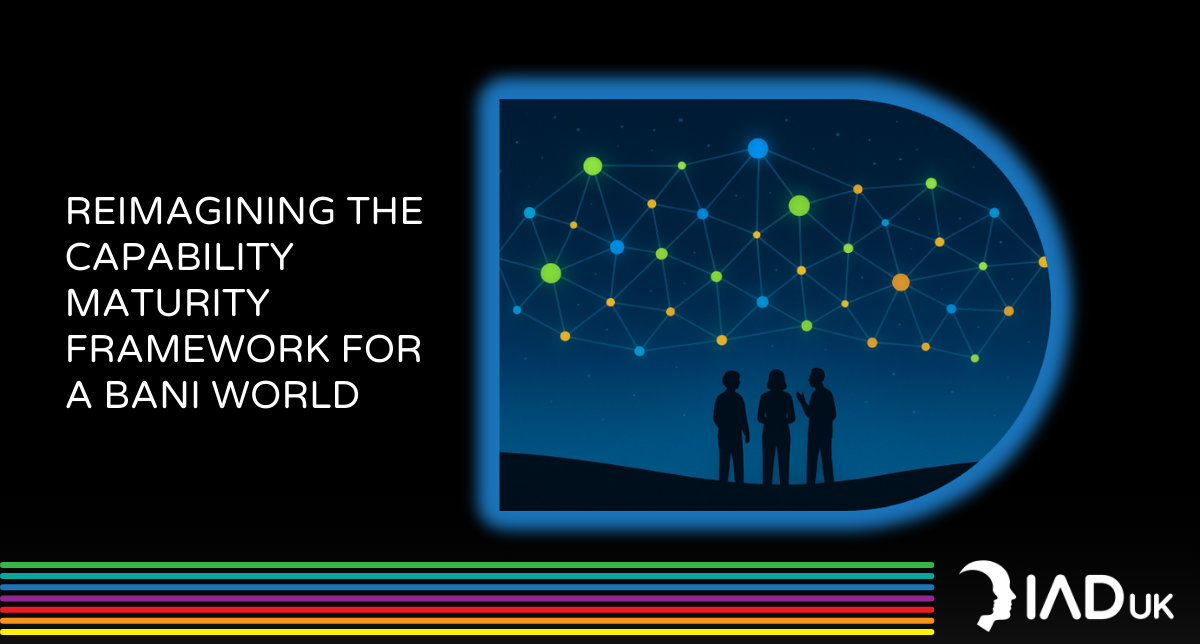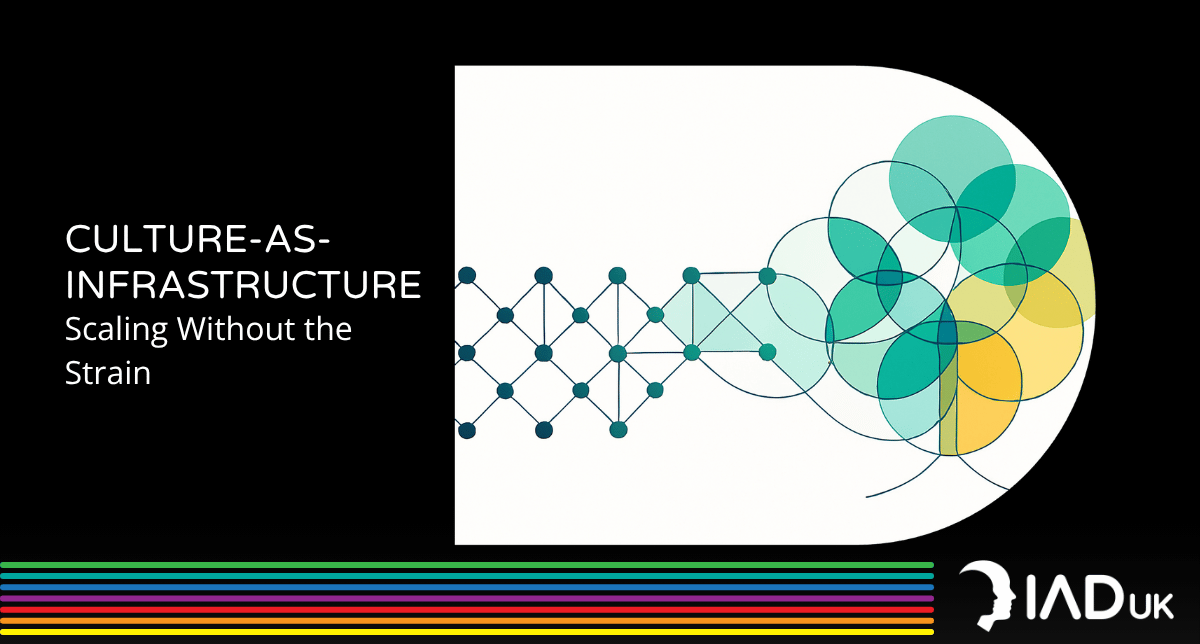Dynamic Intelligence: The Future of Leadership Development
Why Cognitive Flexibility is the Key to Thriving in an Uncertain World

Imagine leading a team in a rapidly evolving market where yesterday's solutions no longer apply, and today's decisions feel obsolete by tomorrow. How do you keep up? How do you thrive in such an unpredictable environment? This is the new reality of leadership—complex, fast-paced, and ever-changing.
Dynamic Intelligence is a revolutionary approach to leadership that goes beyond conventional skills. It’s about developing cognitive flexibility—the ability to adapt your thinking to new, often unforeseen circumstances. Unlike traditional leadership models, Dynamic Intelligence equips leaders with the mental agility to navigate complexity, fostering innovation and resilience within teams.
In today’s business landscape, Dynamic Intelligence is more than just a buzzword; it’s a necessity. Leaders who cultivate this skill are not only better equipped to handle change, they are also more likely to thrive amidst uncertainty whilst cultivating a people-centric culture. It's the difference between merely surviving and truly thriving in a world of complexity.
Dynamic Intelligence is the future of leadership development. It’s not just an advantage; it’s essential for success in the modern world. So, what exactly is Dynamic Intelligence, and how can it transform your leadership approach?
Dynamic Intelligence 101
Dynamic Intelligence (DI) is a capacity that helps leaders adapt their thinking in real-time to address evolving challenges and opportunities. Unlike fixed leadership traits, DI emphasises a leader's ability to consciously choose their cognitive responses based on the context. It involves Intention, Awareness, Choice, and Response —the core components for leaders to recognise their unconscious thought patterns and making deliberate decisions. DI moves beyond traditional leadership competencies by focusing on developing cognitive flexibility and complexity, enabling leaders to better handle the multifaceted demands of the modern business landscape .
Core Components
Intention
Intention refers to the automatic thinking patterns that shape how we perceive and respond to our environment. In leadership, Intention represents the default cognitive responses that often guide initial reactions without conscious Choice.
Awareness
Awareness is the recognition of these unconscious patterns and understanding their impact on our decisions. For leaders, developing Awareness allows them to identify biases and initial reactions, paving the way for more deliberate decision-making.
Choice
Choice is the deliberate selection of cognitive strategies based on Awareness and Intention. In a leadership context, it enables leaders to adapt their responses, choosing the most appropriate course of action in different situations.
Response
Response is the action that results from the combination of Intention, Awareness, and Choice. Effective leadership Responses reflect a leader's ability to integrate these elements to achieve desired outcomes.
Relevance to Leadership
Dynamic Intelligence is essential for effective leadership in today's complex environments. By fostering cognitive flexibility, leaders can navigate uncertainty and make strategic decisions that drive innovation and growth. Whether managing a crisis or developing a team, DI provides practical tools for adapting to change and leveraging opportunities. For HR leaders, incorporating DI into leadership development programs means equipping leaders at all levels with the skills needed to thrive in a rapidly evolving business landscape.
The Role of Cognitive Complexity in Leadership
Cognitive complexity refers to a leader's ability to process and integrate a diverse range of information, perspectives, and situations. It enables leaders to see beyond simplistic, black-and-white thinking and approach problems with a nuanced understanding.
In today's interconnected world, cognitive complexity is vital. Leaders must navigate various challenges, from managing global teams to innovating within competitive markets, requiring a sophisticated mental framework that accommodates multiple perspectives and conflicting demands .
This is particular true in dynamic and fast-paced industries that are rapidly changing or highly competitive, such as technology or finance, industries characterised by complex input-output relationships, such as manufacturing or supply chain management, and even Small and Medium Enterprises (SMEs) where leaders often need to balance exploitative and explorative behaviours to manage limited resources and dynamic environments.
The impact of cognitive complexity on leadership is palpable.
Adaptability and Decision Making
Cognitive complexity enhances a leader's adaptability by enabling them to evaluate situations from multiple angles. This ability prevents snap judgments and encourages more thoughtful decision-making, critical in dynamic environments where conditions change rapidly.
Managing Intricate Tasks
Leaders with high cognitive complexity can manage complex projects by understanding the interdependencies between various components. This skill is crucial for overseeing large-scale initiatives where multiple stakeholders and factors must be aligned for success.
Fostering Innovation and Strategic Thinking
Cognitive complexity supports innovation by allowing leaders to think creatively about potential solutions. It promotes strategic thinking by enabling leaders to consider a wide range of possibilities and outcomes, essential for long-term planning and innovation.
Navigating Ambiguity
Leaders who possess cognitive complexity are better equipped to navigate ambiguity and uncertainty. This ability helps them maintain composure and clarity, even when faced with incomplete or contradictory information, ensuring effective decision-making under pressure .
Addressing the needs of a modern workforce
Cognitive Complexity supports the cultivation of a people-centric culture where the role of a leader goes beyond driving performance to also ensuring that every person in the organisation feels understood, valued, and cared for.
Consider a global manager who successfully navigates diverse cultural landscapes by integrating varied market insights and consumer behaviours. This leader's cognitive complexity allows them to appreciate and leverage cultural nuances, creating strategies that resonate across different regions.
In project leadership, cognitive complexity enables a leader to coordinate multiple stakeholders with competing interests. For instance, managing a cross-functional team to deliver a product launch requires balancing technical, marketing, and financial perspectives to achieve a successful outcome.
During a crisis, leaders with cognitive complexity can swiftly assess the situation from multiple viewpoints, foresee potential impacts, and develop comprehensive response plans. This approach not only addresses immediate issues but also mitigates long-term risks, showcasing the value of cognitive complexity in dynamic situations .
When faced with competing demands, the cognitively complex leader can successfully navigate these to manage and meet the expectations of all parties whilst making sure that their actions are meaningful, reflect company values, and resonate with their team’s own sense of social responsibility.
Cognitive complexity is a powerful asset in leadership, but how does it translate into practical benefits? What makes Dynamic Intelligence the key to unlocking this cognitive flexibility in everyday leadership?
Benefits of DI in Leadership Development
Adaptive Leadership in VUCA Environments
Volatile, Uncertain, Complex, and Ambiguous (VUCA) environments challenge leaders to think on their feet and adapt quickly. In today's fast-paced world, where disruption is the norm, leaders must be prepared to navigate unforeseen changes and challenges constantly.
Dynamic Intelligence equips leaders with the cognitive flexibility needed to adapt swiftly to VUCA conditions. By developing an acute awareness of their thinking patterns and responses, leaders can adjust their strategies and behaviours to suit evolving situations, ensuring they are adaptive and remain effective under pressure.
For example, consider a leader guiding their team through a sudden market downturn. With high Dynamic Intelligence, they can rapidly shift focus from long-term plans to immediate survival strategies, recalibrating goals and realigning resources to address the new reality. This adaptiveness is crucial for steering organisations through turbulent times.
Connection to Behavioural Complexity
Behavioural complexity refers to the ability to exhibit a wide range of behaviours and adapt them according to different situations. It enables leaders to switch between various roles, from being directive in a crisis to empowering in routine settings.
Dynamic Intelligence fosters behavioural complexity by enhancing leaders' Awareness of their Cognitive Intentions and Responses. This Awareness allows them Choice of the most appropriate behaviour for the context, effectively managing diverse situations and team dynamics.
For instance, a leader with high behavioural complexity might seamlessly transition from being a coach who nurtures personal growth and team autonomy to a decisive strategist who makes tough calls during a crisis. This flexibility is invaluable in maintaining team morale and achieving organisational goals across varying scenarios.
Fostering Innovation and Creativity
Innovation is crucial for organisational success, particularly in a rapidly evolving business landscape. Leaders who foster creativity within their teams drive continuous improvement and ensure their organisations stay ahead of the competition.
Dynamic Intelligence encourages leaders to think beyond conventional solutions. By promoting cognitive flexibility, DI enables leaders to approach problems with an open mind, fostering a culture of experimentation and learning where new ideas are welcomed and tested.
A leader leveraging Dynamic Intelligence might implement brainstorming sessions that challenge existing processes or encourage cross-functional collaboration to generate diverse ideas. This approach not only sparks creativity but also instills a sense of ownership and engagement among team members, enhancing overall innovation capabilities .
While Dynamic Intelligence clearly brings significant benefits to leadership, how does it compare with traditional leadership development models? Could the traditional focus on skills and experience be limiting your potential?
The Shortcomings of Traditional Leadership Development Approaches
Traditional leadership development models often focus on building technical skills and drawing from past experiences. These models emphasise training leaders to handle specific tasks or replicate the success of previous situations.
While valuable, these models can be limiting as they prioritise established competencies over developing the capacity to think dynamically and adapt to new challenges. In rapidly changing environments, these models may fail to prepare leaders for unforeseen complexities .
Risks and Limitations
Lack of Relevance and Engagement
Traditional approaches may not resonate with the current demands of leadership, often feeling outdated and disconnected from the real-world challenges leaders face today. This can lead to a lack of engagement among participants, who may not see the relevance of the training to their daily roles.
Outdated Content
Content that focuses solely on past experiences and set skills can quickly become obsolete in a world where technology, markets, and customer expectations evolve rapidly. This leaves leaders ill-prepared for contemporary challenges and unable to respond effectively to new opportunities.
Insufficient Focus on Cognitive and Emotional Skills
Many traditional programs neglect the development of cognitive complexity and emotional intelligence, which are crucial for navigating the uncertainties of modern leadership. Without these skills, leaders may struggle to make informed decisions and maintain resilience under pressure.
Contrast with Dynamic Intelligence
Unlike traditional models, Dynamic Intelligence focuses on cultivating adaptability, cognitive flexibility, and “emotional intelligence” (socio-emotional adroitness). This approach recognises that effective leadership requires more than just technical skills; it demands the ability to think critically, adapt quickly, and respond appropriately to changing circumstances.
Dynamic Intelligence equips leaders with the tools to continuously learn and adapt, making them better prepared to face the complexities of today’s business environment. By fostering a mindset of ongoing development and real-time problem-solving, DI enables leaders to thrive amid uncertainty.
If traditional models are falling short, how can organisations effectively implement Dynamic Intelligence in their leadership programs? Let’s explore some practical strategies for development.
Implementing DI in Leadership Programs
To effectively integrate Dynamic Intelligence into leadership development programs, organisations need to adopt practical strategies that focus on enhancing cognitive flexibility and emotional intelligence. This involves moving beyond traditional training methods and incorporating developmental techniques that address the unique cognitive needs of each leader.
Cognitive Assessments
Cognitive assessments, such as those offered by the Identity Compass ®, play a crucial role in identifying leaders' cognitive styles, strengths, and areas for development. By providing a detailed understanding of an individual's Cognitive Intentions and Thinking Styles, these assessments establish a personalised baseline. This allows for the creation of tailored development plans that target specific cognitive needs and enhance leaders' capacity for dynamic thinking.
MCO-Facilitated Workshops
More Complex Other (MCO) facilitated workshops are an integral part of developing Dynamic Intelligence. In these workshops, facilitators—who are at a higher level of cognitive development than the participants—challenge assumptions, highlight unconscious thinking patterns, and encourage participants to recognise their Cognitive Intentions. This process raises Awareness and fosters cognitive growth, enabling leaders to move beyond their default responses and adopt more flexible thinking strategies.
Developmental Facilitation
Developmental facilitation supports leaders in applying Dynamic Intelligence principles in their everyday roles. Facilitators guide leaders in translating cognitive insights into practical actions, helping them navigate complex situations with greater agility. This ongoing support fosters a culture of continuous growth and adaptability, empowering leaders to respond more effectively to changing environments.
Personalised Developmental Coaching
Personalised developmental coaching is essential for reinforcing the principles of Dynamic Intelligence. Coaches provide one-on-one feedback and strategies tailored to individual leaders, helping them enhance self-awareness, improve decision-making, and increase adaptability. Through personalised support, leaders can develop a deeper understanding of their cognitive processes and learn how to leverage them for better outcomes.
At the IAD we have successfully used these strategies to improve sales and sales outcomes, create the conditions for organisational transformation, and help to develop the leaders of the future.
As organisations begin to adopt these strategies, what does the future hold for leadership development?
The Future of Leadership Development
The business landscape is constantly shifting due to technological advancements, globalisation, and emerging challenges. As these changes accelerate, the requirements for effective leadership are evolving. Leaders are expected to be more adaptable, innovative, and capable of navigating complexity.
Modern leaders must possess the ability to think critically, manage diverse teams, and drive strategic initiatives that align with global market demands. They need to be agile and forward-thinking, ready to respond to rapid changes and unforeseen challenges with confidence and clarity.
Dynamic Intelligence offers a sustainable approach to leadership development by focusing on cognitive flexibility and adaptability. Unlike traditional methods that emphasise fixed skills, DI prepares leaders to thrive in an ever-changing world by continuously learning and evolving their thinking patterns.
By fostering Intention, Awareness, and Choice, DI equips leaders with the tools to handle ambiguity, innovate, and generate effective Responses to new challenges. This approach ensures that leaders are not only prepared for today’s demands but are also future-proofed for what’s to come.
HR leaders are in a unique position to drive the adoption of Dynamic Intelligence in their organisations. By integrating DI into leadership development strategies, they can build a pipeline of agile, forward-thinking leaders who are ready to tackle the complexities of the future.
As the world evolves, so must our approach to leadership. Are your leaders equipped to meet the challenges of tomorrow?
The time to invest in Dynamic Intelligence is now.
Conclusion
Dynamic Intelligence is redefining what it means to be an effective leader in today’s complex world. By emphasising cognitive flexibility and adaptability, it empowers leaders to navigate uncertainty and thrive in volatile environments. Through Intention, Awareness, Choice, and Response, Dynamic Intelligence equips leaders with the tools they need to innovate, make informed decisions, and drive their teams toward success. As traditional models of leadership development become increasingly inadequate, embracing Dynamic Intelligence is essential for building the leaders of tomorrow.
Leadership is no longer just about experience or technical skills; it’s about the ability to adapt, learn, and evolve: to be Adaptive. Dynamic Intelligence provides a framework for continuous growth, helping leaders develop the cognitive agility needed to meet the demands of a rapidly changing world. The future of leadership development starts with embracing this transformative approach today.
If you would like to discuss how we can help your organisation to thrive in an uncertain world, please get in touch.
Alternatively, you can read more about the IAD's approach to increasing leadership cognitive complexity




